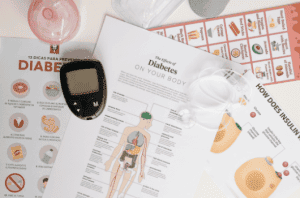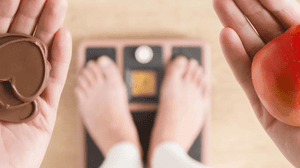
Have you ever wondered what diabetes actually is? And what each type of diabetes means? Read this blog for all you need to know about diabetes, and how to manage the condition.
Almost 5 million people in the UK have diabetes, with more people than ever at risk of developing type 2 diabetes.
First things first: What is diabetes?
Diabetes is a disease that occurs when blood sugar levels (also known as blood glucose) are too high. Insulin, a hormone produced in the pancreas helps glucose from food be taken into cells. Diabetes occurs when the body cannot produce enough insulin or is unable to use insulin properly.
Over time, the accumulation of glucose in the blood can cause severe health problems and complications.
Although you can’t cure diabetes, staying active and eating healthily can reduce the impact diabetes has on your life.
Prediabetes
Prediabetes is a medical condition classified by blood sugar levels that are higher than normal but lower than the Type 2 range. Prediabetes is usually caused by an unhealthy weight or lifestyle but knowing the risk factors can prevent or even delay up to 50% of Type 2 diabetes cases.
Read our blog on prediabetes here

What are the main types of diabetes?
Type 1:
Type 1 diabetes is when blood sugar levels are high because your body is unable to produce enough insulin. This is because your body attacks the cells that produce insulin in the pancreas – and so you are not able to produce any insulin. Therefore, the sugar in your blood remains elevated. Type 1 diabetes is an example of an organ-specific autoimmune disease.
People with type 1 diabetes need to take insulin, approximately 8% of people with diabetes in the UK have type 1.
Although you cannot reverse type 1 diabetes, making changes to your diet and lifestyle may significantly impact how you feel. Eating healthy and balanced meals is an effective way to manage your blood sugar levels and can make a difference in how you feel.
Type 2:
The most common form of diabetes in the UK is type 2 diabetes. Unlike type I diabetes, your body produces insulin; however, your body is unable to use it effectively. Type 2 diabetes is usually caused by several factors, including genetics, lifestyle and weight.
People who are obese are more likely to develop type 2 diabetes, this is because obesity increases your risk of developing health complications and having excess fat tissue causes insulin resistance, which can lead to type 2 diabetes at high levels.
Want to learn more about type 2 diabetes? Watch a short video by Dr Frankie:
Gestational Diabetes:
Gestational diabetes is a type of diabetes that develops during pregnancy in women who don’t have diabetes. This develops due to high levels of blood sugar because your body is unable to produce enough insulin that meets the extra needs for pregnancy – this only lasts throughout the pregnancy and disappears after.
How do you manage diabetes?
Manage your diet: The food you eat is an essential part of managing your diabetes. Always aim to have a healthy balanced diet with a variety of nutrients such as protein and fibre. Why not try our Snack Shots? A healthier alternative to high sugar snacks that are packed with nutrients, protein, fibre and are under 105kcal per pack!
For type 2 diabetes, lose weight!Recent research has shown that weight loss is themost effectiveway to manage type 2 diabetes. Some studies even show that a very low-calorie meal replacement diet may successfully send type 2 diabetes into remission.
Our 800 calorie plan is an easy and effective way to consume a nutritious very low-calorie diet. With a variety of meal replacement products and flavours, take a look at our weight loss plan.Get out and get active: Exercise is another effective way in managing diabetes symptoms.
Research shows that exercise can help manage insulin levels, reduce cholesterol and even reduce stress.
weight loss is themost effectiveway to manage type 2 diabetes
*Please consult your doctor if you are looking to exercise on an exante diet plan.
Our closed Facebook group is a perfect place to find likeminded individuals looking to reach their health goals. And here at exante, we’re determined to support you every step of the way, why not join us now?
Make sure to connect with us on our social media platforms for updates on new product launches and join our newsletter to be the first to hear about our exclusive offers and discounts!









